The Movies Walkthrough
Running a movie studio is hard work, but GameSpot's Walkthrough to the Movies has plenty of hints and tips for enterprising movie moguls.
Design: Collin Oguro
With two games hitting shelves in the space of as many months, one shouldn't accuse Peter Molyneux's Lionhead Studios of being lax in their development duties. Although Black & White 2 hit shelves barely a month ago, they're already following up that release with The Movies, a highly-anticipated movie mogul simulation / amateur filmmaking tool.
Since there isn't really much of a storyline to the game, a walkthrough is obviously impossible to write, but if you're looking for information, we've got plenty of that. For some pointers on getting started in the game and setting up your studio, check out the General Tips chapter. You can find a list of the prominent buildings and their functions in the Buildings chapter. For learning about your stars and how to keep them happy (and highly-ranked), check out the Dealing With Stars and Maximizing Prestige and Star Power chapters. The Maximizing Prestige and Star Power chapter will also give you some pointers on keeping your studio lot in good repair. You can find information on making films in the Making High-Quality Films chapter, as well as in the General Tips. Lastly, if you're looking for information on the game's Certificates, check the Certificates chapter.
Note that this guide mostly focuses on succeeding in the tycoon portion of the game. The quality of your custom-made films revolve more around aesthetics than economics, so we'll let you explore the world of subtitles and post-production on your own. If you're playing in Tycoon mode, though, you'll hopefully find plenty of information here. Enjoy!
General Tips
When you first load up a game of The Movies, you'll want to be sure to take the tutorial that's available to you. You can skip it if you want, but the tutorial is going to be the best way to learn the many nuances of the game, and will give you a lot of tips as you proceed through the first couple of years of your movie empire. It won't necessarily give you specific tips on how to make the most of your lot, though, so we thought we'd go ahead and put out some pointers on how to start rolling in the cash fairly early on.
Starting Out
Practice Makes Perfect
After you build your first Stage School, you'll probably wind up attracting only four potential workers for that building. Most of the early movies you're going to be making will only have room for one star, so in our opinion, it's best to make two stars and two directors with your first four prospects. That will allow you to have one movie in production and another one in rehearsal, or two in production at the same time, depending on how many sets you're willing to build for yourself.
Speaking of sets, it's probably best in the early going to concentrate your efforts on one or two genres of films. If you're playing with the tutorial, then you'll have a couple of scripts show up at your studio gates automatically, but after you build your first Script Office (which will be available for building at the beginning of the game if you play without the tutorial, as a note), you'll be able to instruct your writers to create scripts in specific genres.
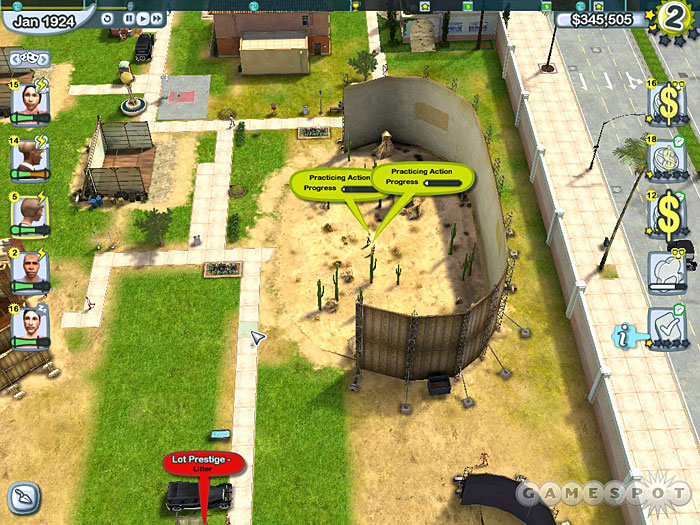
The reason this is important is because you can command your directors and stars to practice in a given genre when they're not filming or rehearsing a new film. If you task one director and star to practice on a lot, you'll be told in a pop-up what kind of genre that they'll be working on; the generic Stage, for instance, will usually be tasked to romance films. If you make a director and a star practice together, they'll gather experience in the genre and will hopefully gain a better working relationship, as well, so that when you go to make a film of the genre that they've been practicing, they should both perform better, which will result in a better film that gets better reviews and makes more money, all of which will help your studio's prestige level.
As time goes along, it seems profitable to have actor/director pairings to concentrate in one genre of film and pump out those films over and over again, with periodic dips into another genre just for the sake of variety. If you have an actor and director that specialize in a certain genre, then you'll find that they should quickly start imparting large bonuses to the quality of films in that genre; so long as you can keep them happy, keep building new sets for the novelty factory, and build better Script Offices to produce better scripts, then you should be able to steadily improve the quality of your films, which will make them gross more, and will also result in higher star power for your stars.
Keep Cranking Out Scripts
After you build a Script Office, hire the scriptwriters that come to your door, then task them to relentlessly start churning out scripts as quickly as possible. Scriptwriters don't have moods, so you don't have to worry about overworking them, and indeed, the more they work, the better they'll get at writing scripts, resulting in higher quality productions down the line.
Of course, you'll probably wind up creating more scripts than you can actually use at this point, so be sure to invest in a Star & Script Selling Facility. You can drag your excess scripts (saving the highest-quality scripts for yourself, of course) to the Selling Facility and dump them on other studios for extra cash. This is also true when you first build an advanced Script Office; when you do make a new office, you'll be able to create scripts with a higher star rating. You can push the older scripts through production, if you wish, but you might want to just sell them and concentrate on the higher-ranked scripts as they become available.
Plan For The Future
Between all of the buildings that you need to build and some minor landscaping, such as laying down grass around your structures, you might find yourself outlaying quite a bit of cash in the first year or two of your studio's existence. This isn't a bad thing, though, and in fact the investment you make in your studio now will pay dividends later on. After all of your initial construction and prettification is done, you'll likely be down to around 20 or 30 thousand dollars in the bank before you release your first film and start making some of it back.
(As a note, we found it handy to build two Stage sets at the very beginning of the game. A lot of the very first scripts that you produce will use the Stage, so it's helpful to have a backup in case you need to practice Comedy on one of them while shooting an Action on the other.)
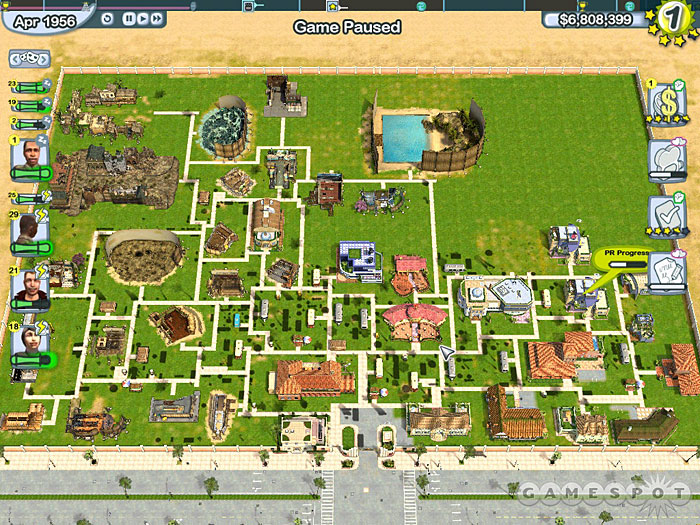
Even before you start laying down your initial buildings, though, you'll want to start planning ahead by laying all of your sets in the same general area. Your sets, Casting Office, and other high-traffic buildings should hopefully be clustered together, with another nearby area set aside for the large number of trailers that you'll need to build later on. It's most important that your sets be built near each other, though, to reduce the time it takes to walk from the Casting Office, or from set to set when films start using more than one set. It can be tough to lay out enough space for the sets, though, since they can easily wind up taking a third or a half of your total available land (if not more) if you insist on building one of each kind of set. Just set aside a lot of land for sets. If you hit the M button to bring up a bird's-eye-view of your lot, it's probably best to build the sets off to the left or the right, then start working your way up to the north wall, rather than have them stretch out east to west.
By the same token, you should also try to recognize which buildings can be built well away from the core of your studios. We're talking here about things like the Crew Office, Production Office, Script Offices, and other buildings that your people don't need to reach too often. You can drag scriptwriters back to the Script Office whenever they walk away, for instance, and finished films can be shuttled around between the Production Office or the Star & Script Selling Facility with your mouse, requiring little input from your peons. You can safely set aside a corner of your lot for buildings like these, away from the areas where your stars have to walk around. Just make sure that they're well connected to paths leading back to the main portion of your lot, so that your Builders can come along and repair them as needed.
Into The Future!
After you start unlocking the advanced varieties of the Script Office, you'll be able to start making more advanced films. The Intermediate Office will let you make scripts of around two stars, while the Proficient Office will bump that up to around three, dependent on the skill of your scriptwriters and (apparently) the amount of public interest in the genre you're working in. When you start to hit three-star scripts, you'll find that the process of making films will become dramatically more complex than you're used to, with most productions requiring three crew members, three actors, three extras, and a director. Most of these films will also have nine scenes and require many months to film.
Pace Yourself
After you get out of the growing pains section of the game, it's time to start really working on earning the reward certificates that will periodically pop up. Doing so will unlock new structures for you to build, notably including new script offices early on, which are vital to increasing the quality of your films and thus the amount of money that you make.
Most of these early certificates revolve around increasing the star rank of your stars, films, and studio lots, as well as having a lot of cash on hand. The emphasis here is on quality rather than quantity, so you'll probably want to slow yourself down a bit and ensure that you have just enough actors and directors to make films, but not too many to manage at once.
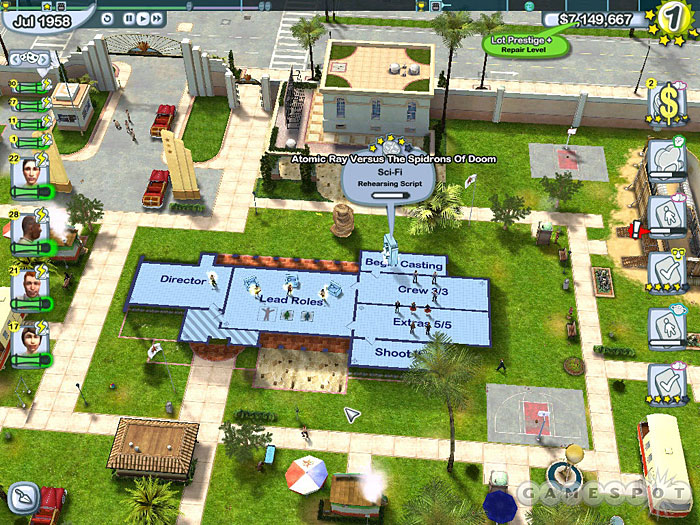
A good balance here for the bulk of the game will be to have two teams of stars, each consisting of one director and three actors, each specializing in one or two genres. That's eight total stars to keep track of, which should be fairly manageable for most people, especially since you'll really only have to worry about the star power of one or two of them at most. (You'll want to have one highly-rated actor and one highly-rated director, but the rest of your stars won't need to be highly-rated, just happy and proficient in a genre.) You might not be able to have both teams making films at the same time, especially if you're running short on extras, but that's not too bad, as it'll let you focus on de-stressing one team while the other's filming. If you really find the micromanagement tedious, then you can narrow your focus even more and just focus on one team of stars, with a director and three or four actors, and use them to produce all of your films, but this will cause cash flow problems as time goes on.
Of course, you'll periodically get more talent lining up outside your Stage School, both fresh young faces and stars that attempt to join you from a rival studio. If you're happy with the stars that you have, you can just make any incoming stars into extras (which you will need plenty of as time goes on). If you're trying to convert a star that's defected from another studio into an extra, you'll need to hire them, then fire them, then wait for their replacement to show up; they'll refuse to become an extra themselves. Alternately, if you find that one of the new stars is a bit easier to manage than your own, you can fire or sell one of your existing stars and replace them with the new talent, then make the replacement for your older talent into an extra.
Extra Notes
Although they'll probably be kept fairly busy, it's worth noting that you should always, always have your extras practicing on a set if they're not actively filming. While this kind of micromanagement might be a bit much to handle, they'll get experience for the genre that they're practicing in (and this does affect the quality of a film, albeit in a minor way). This can be important later on in the game, when your stars are beginning to age and retire, as you can sometimes promote extras into actor or director roles to replace them, or just fire them as well to get new meat in your Stage School employment line.
Note also that your directors and actors aren't capable of being demoted into extras; they'll simply refuse to be placed in that section of the Stage School. If you want to turn one of your stars into an extra, you'll need to fire them, wait for the replacement actor to show up in your employment line, then plop them down into the extra slot. Note, again, that you can take individuals from any employment line and make them into extras, so if you have an excess of builders or janitors or something, you might want to make one of them extras, if only to fill out the rosters, especially if you have two teams of filmmakers going at the same time.
Dealing With Lengthy Productions
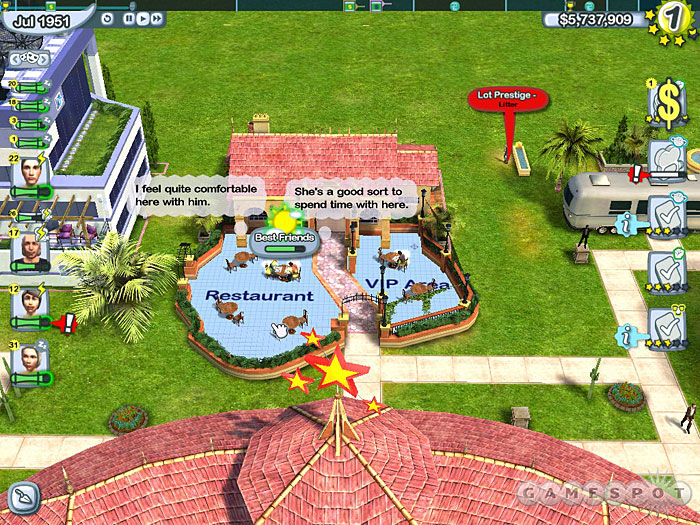
Keep in mind that, if one of your productions is taking long enough to stress out your stars, you can always halt production on it temporarily by dragging the script off of the set it's on and onto the ground. (Or over to a Publicity Office if you're willing to shut down production for a while, but gain some public awareness at the same time.) Doing so will allow you to plop your stars down to the bar or restaurant to quickly them a shot of the good stuff to buck them back up into working conditions. This is mostly a problem with stars with very low tolerance for stress, of course, but the longer a production is, the more likely you're going to be hitting the stress tolerances on a number of the stars involved. In general, if they're running low on stress, but are still in a pretty good mood overall, you can just leave them be until they start to literally redline on stress, and only then drag them to the bar for a few shots.
As productions get longer, you may find that some of your stars will begin to head out for drinks or food during a shoot, on their own initiative, even if their stress levels are pretty good. This will cause the usual array of red exclamation points to appear on the screen, so keep an eye out for them and drag the offending peon back to his labor.
Buildings
This section of the guide is intended to guide you through some of the various buildings that become available to you in The Movies. Most of these will not be buildable at the beginning of the game; many of them will be unlocked at certain periods of time, some will be unlocked through research at your Laboratory, and some will be unlocked when you earn Certificates.
Stage School
The Stage School is an interesting building, and is certainly vital to the well-being of your lot. With it, you'll be able to recruit more of the movers and shakers that will contribute to your studio's money-making endeavors. Namely, it'll let you hire actors, extras, and directors.
When you first create a Stage School, you'll see a line of actor wannabes line up outside of it, waiting for you to hire them. Before you start plopping them into roles, though, pause your game and right-click on each of them to get an idea of their particular strengths and weaknesses. You'll get two bar readouts right away: Looks and Physique. Each of these are important when it comes to the appeal of that star to your audience. While there may be room for unattractive character actors in the real world, things are a bit simpler in The Movies, so you'll have to rely on your recruits' raw good looks to help get them over in the world of film. Wannabes that have poor looks or physique will be better suited to extra or directorial work than they will be for starring roles.
Next up, you'll also get a list of personality traits. Ideally, these won't come into play overmuch in the final product of your films, but these will determine how easy it is to work with the character. You'll be able to gauge your prospect's mindset in a number of areas, including how tolerant they are of other stars, their overall calmness, their tolerance for boredom, how much they like to eat or drink, and so on. Some stars are just going to be more high-maintenance than others, unfortunately. Early in the game, you're going to need all the bodies you can get, but you might want to take anyone that seems like a real boar and cast them as extras, where you won't have to worry much about keeping them happy.
Crew Facility
The Crew Facility will be where you hire and fire your movie crews. That's pretty much all there is to it; just take as many people as you want from the unemployment line as you wish and hire them as crew, and they'll move off and start working on any movies that go into the Casting Office. They have no need to return to this building when they're hired, so you can feel free to build it somewhere off to the side of your main working area; just make sure your builders can reach it to repair it when it falls into disrepair.
Casting Office
The Casting Office is where you decide who stars in and directs a film after you have a script ready to shoot. To begin casting a film, drag the script from your script office to the Begin Rehearsing room in the Casting Office; at this point, your crew and extras will automatically be assigned to the film. You will have to manually choose the primary actors and directors, however, but this is a good thing, as it will let you pick talent based on their relationships, star power, and experience with the genre that's being filmed.
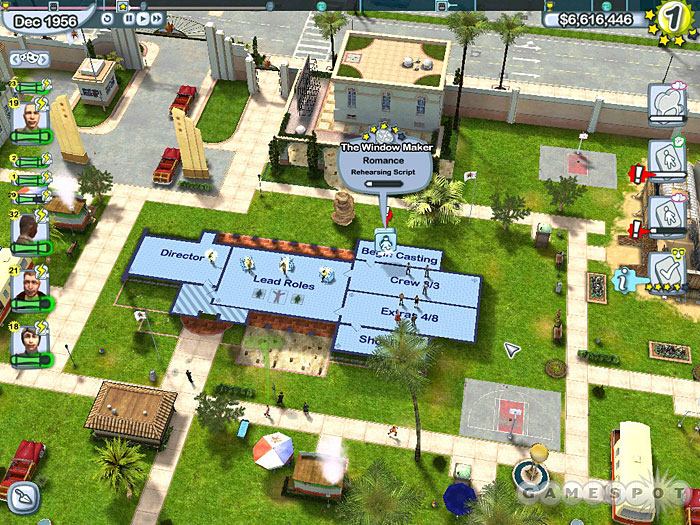
Note that, as soon as you put a script into the Shoot It box, the cast and crew will leave the Casting Office and head towards the set where the script will be shot. Thus, it's best to have the casting office somewhere near your sets, to reduce the amount of travel that they have to perform. Note also that, if you don't want to shoot a movie immediately after it's done rehearsing (or if you're incapable of doing so due to a missing actor or a set that's already being used), you can drag the script out of the Begin Rehearsing box, and set it down outside the building. This will let your crew and stars leave the building and do whatever they normally do in their free time; to bring them all back when things are more optimal, just drag the script back over to the Rehearsal option.
Production Office
The Production Office deals with films when they're ready to be released. When you complete filming on a movie, its icon will head to the Production Office, where you'll be able to move it onto the Release tab to send it out into the world and start making back the money you spent on its production. Alternatively, if you wish to get an idea of how it'll perform, then you can move the script directly to the Reviews tab to get some advance screening feedback. Alternately, you can move the script right to the Archives if you want to just shelve it entirely. This might be worthwhile if you've somehow produced a truly awful movie that you're afraid will drag down your studio's prestige, but in most cases you'll be able to avoid this with adequate planning.
After a movie's been released, its icon will sit in the Release tab for a while, as it constantly brings in cash during its theatrical run. Over time, the rate at which a movie brings in cash will slow down, and eventually stop, at which point you'll have to move it to the Archive, which is mainly intended to save your previously-made films in case you want to watch them again at some point in the future.
In addition to these tabs, the Production Office can also be used to check your Finances; to do so, drag the information icon in the middle of the building over to the Finance tab, which will pop up a full screen in which you can analyze your studio's financial situation. From this screen, you can give check how much films cost versus how much money they've made, check your talent's salaries compared to their market value or give them raises, and so on.
You can also right-click on the information icon to bring up a display of your studio's prestige, and all the factors that go into it, such as sanitation or connectivity. You can learn more about each of these factors in the Studio Prestige section of the Maximizing Prestige and Star Power chapter.
After you unlock the Publicity Office, the Release tab will be upgraded to allow you to spend money on promoting your film when you release it. The higher the public awareness of a film, the more money you should spend on it. If you spend a lot of money on promoting a film that has low public awareness, you'll garner negative reviews. See our discussion of the Publicity Office for more details on how to raise awareness of a film.
Script Offices
Your first Script Office will be where you task your scriptwriters to create their cinematic masterpieces. At the outset, you'll likely only have a pair of scriptwriters to work with, and you'll only be able to write one script at a time, but since writing a script takes less time than does rehearsing and shooting it, you shouldn't have any problems producing enough scripts to keep your stars and directors busy. Just be sure to create scripts in the same genres that your stars and directors have been practicing in to ensure that their ratings and reviews are as high as possible.
Over time, you'll unlock new script offices, such as the Intermediate, Proficient, and Advanced Offices. These act in precisely the same manner as the Basic Office, but will automatically turn out better scripts, without further input from you; they do seem to require longer periods of time to create their scripts, though. When you obtain a new Script Office, you can usually demolish the older ones, but you may want to keep two Offices open at the same time. More advanced Script Offices do create higher-ranked scripts, but these scripts require much more effort to produce, meaning that they'll need more actors, more extras, larger crews, and substantial time investments. These are great for producing scripts in your strongest genres to try and create blockbusters with, but you might also want to use a less ambitious Script Office to create smaller films for your secondary team of stars to keep the money flowing in without tying up your sets forever.
Makeover Department
Your Makeover Department will let you enact costume changes during filming, or can simply be used to give your stars a new look when they become disenchanted with their appearance. You can either choose to produce a full Makeover, which will let you control all of the changes made to your star, or plop them down in the Auto selection, which will take longer, but which will let them make their own decisions regarding how they want to look.
Every once in a while, you may notice that your stars' Image satisfaction rating plummets. This usually indicates that new, more fashionable outfits are available to wear. This often occurs at the end of every decade, when you can switch all of your stars from one decade's clothing to that of the next. Wearing out-of-date clothes will greatly distress your stars, so be sure to keep an eye on the date and bump them up to new clothes when it becomes appropriate. You should also do this when you hire new stars, to ensure that they have appropriate threads. Makeovers don't cost anything, but can have a large effect on your star's mood.
The Makeover Department also acts as a costume change facility for movies that require your stars to change outfits in the middle of shooting, or so it would seem. Try to build it somewhere near your sets so that your stars won't have to travel too far to get changed.
Custom Scripting Office
If you want to make and film your own custom movies, then you'll need to use the Custom Scripting Office to create a custom script. It's custom!
We'll confess to not using this much during our game, since we were focusing on excelling at the Tycoon portion of the game. You can certainly create your own scripts for the game's story mode, if you wish, and doing so will allow you to do things like focus on sets with high novelty value, or use a bunch of different sets in a film. If you don't want to worry about all that, though, you probably won't get much use out of the Custom Script Office.
Star & Script Selling Facility
The SSSF is your place to sell off excess scripts or hoary old stars that you don't necessarily need anymore. In most cases, you probably won't need the actual cash that's generated here, as it'll be relatively minor in comparison to what your actual movies bring in. However, since you need to get your scriptwriters a good amount of practice to increase their skill, you'll probably want to have them cranking out scripts like madmen for most of your studio's lifetime. This can result in quite a backlog of scripts outside your Script Office. If you don't want to film all of them, and you probably won't, you can just sell any scripts that are of an unpopular genre or are of poor quality (by dragging them here from your Script Office), net some cash, and clear up some of the script clutter on the right side of your screen.
Post Production
Post Production is where you can add useful effects to your films and fiddle around with things like the scene order, subtitles, music, and so on. If you're only interested in playing as a tycoon, you can safely ignore the Post Production building, as the changes made here apparently have no (or very little) impact on the star rating of your films. If you're planning on uploading your film to the Movies website, or exporting it to show it off for your friends, though, you'll want to explore the capacities of the Post Production Office, as this is where the bulk of a film's personality can be brought to the forefront.
Restaurants
Whether it's a Snack Van or a more posh eating establishment, Restaurants are a requirement for satiating your studio personnel's desire for hunger-quenching refreshments. As far as your Stars go, they can relieve stress by eating, or date other stars at restaurants. (To force stars to go on a date at a restaurant, place one in one of the slots at a table, and then place the other star at the nearest slot to the first.) Note that restaurant dating is a bit intimidating for mere acquaintances, though. If you're trying to get people interested in one another, just have them talk to each other, or take them to a bar.
Bar
Like Restaurants, bars help relieve stress by getting your stars drunk, and can also be used for dating as well. The atmosphere at a bar is a bit less intimidating than a restaurant, though, so a bar is a good place to bring a budding friendship. When two stars start expressing a desire for more intimate surroundings when they socialize with one another, bring them to the Bar, then the VIP Bar, then bump them up to a restaurant when they're ready to become Best Friends or Soul Mates.
Laboratory
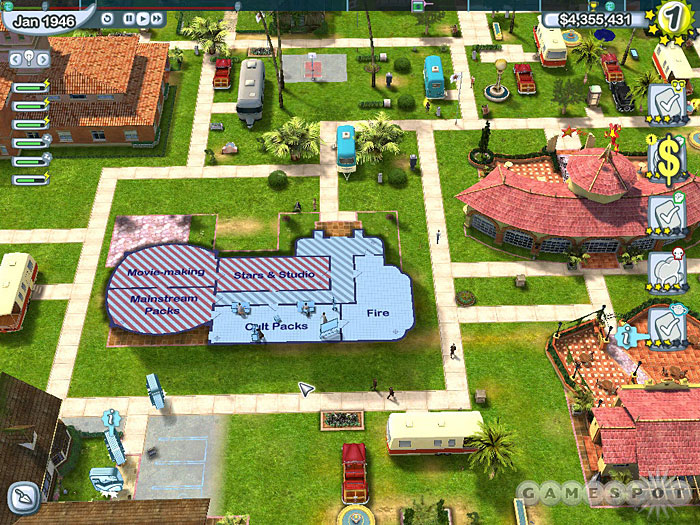
The Laboratory is one of the more important buildings you can build during the game's middle decades. When you unlock it, build it immediately, and get your scientists right to work. You have four sections of research options available to you, but you can only assign four scientists to work on one section at a time. Thus, if you have more than four researchers, you'll have to spread them out amongst different packs, but that's not such a bad thing, as you'll probably want to be researching a couple of different topics at a time.
The research options are as follows: Cult Packs, which unlock new sets, costumes, and props for your Horror and Sci-Fi films; Mainstream, which unlocks new sets, costumes, and props for your Action, Comedy, and Romance films; Star & Studio, which unlocks new casual fashions for your stars and new buildings; and Movie-Making, which unlocks new technologies designed to increase the appeal of your films, such as color film and better camera technologies.
In our personal opinion, the one you probably want to focus most on here is the Movie-Making section. Unlocking color film or other advanced film technology before the other studios do will greatly benefit the appeal of your films for a long time, and if you build up a lead over the other studios in this area, you should be able to routinely release the highest-ranked film during the period between any given awards ceremony, if not the top three or four. After that, our order of preference was Star & Studio, to unlock new buildings, then Mainstream, then Cult. We didn't film very many sci-fi or horror films, but if you concentrate on those genres, feel free to emphasize the Cult pack over the Mainstream.
Most of the packs that are available for research are locked until a certain point in time, which means that, if you research proceeds ahead of schedule, you'll periodically find yourself with a Laboratory that has no available research in it. If this occurs, you can temporarily retask your Researchers into Builders or Janitors, as needed, then bring them back to their real jobs when more packs are unlocked for research. If you don't want to research a specific pack, then it will eventually become unlocked for use on its own, but this usually doesn't happen until 15 years or more have passed.
Design: Collin Oguro
Publicity Office
The Publicity Office will allow you to raise the public awareness of a script or film before it's released, thus letting you gain more cash from the film, in proportion to the amount of money you spend on promoting it.
Publicity Offices only have one functional room inside of them: PR. You can drag either a script or a star onto the PR slot to start the Publicity Process on it. Publicity requires a little time to take effect, so after you drag a script or star onto the PR room, be prepared to leave them there for a while. Luckily, though, you can start the PR process on a raw, uncasted script, before you drag it to the Casting Office, and you'll definitely want to take advantage of this; just run your script through the PR process immediately after it's done being written to start generating a bit of interest in it. You can put a script through the PR process a few times before you max out its pre-production interest. You may also be able to drag scripts that are actually being shot to the PR office during filming, such as when your stars need to get drunk to relieve stress during the middle of a long shoot; it's worth a try, at any rate.
After a film has gone to the Production Office and is ready for release, you can drag it back to the PR office for another round of PR on it, or you can drag some of the stars involved in the production to the PR office and have them perform a press junket. The important thing to consider here is that you can have multiple PR Offices. You'll want at least a couple, and preferably three or four, to get as much PR as you possibly can on your biggest films. When you're done shooting a script, bring it to a PR Office, then set up junkets for a few of the biggest stars involved with the script in the other PR Offices. This will delay the release of your film for a couple of months, but the resulting boost in interest will let you spend more on marketing and increase the overall profit that the film will bring in.
As a note, you can drag a star to a Publicity Office at any time, except when they're shooting films, to have him or her enter a press conference. The good thing about press conferences is that they automatically add one full diamond of rating to the star's Press factor, which goes into their overall star power rating. That's one-third of their maximum Press factor, and is a lot quicker than dealing with photographers.
Cosmetic Surgery

If you're looking for a quick boost to a star's Image rating, then you can bring them to the Cosmetic Surgery clinic, where a variety of operations are available to help keep them beautiful through their advancing years.
The first operation you have available to you is Nip/Tuck, which will give your star a good boost to their Looks rating, and will also reduce their apparent age by twenty years or so, increasing their genre fit for most film genres. This is an important procedure to perform on your top stars, as it will have a large impact on their Image rating, and extend their working lifetime a bit for the youth-oriented genres, like Action.
The other two options here aren't unlocked until later on in the game; both of them also affect your Image rating, but in different ways. Liposuction will increase your star's Physique rating, thus allowing them to perform physical roles, such as in Action films, and be more believable. Implants are another basic way to increase your Looks, which are in turn important for genres where that's important, such as Romance or Horror.
Rehab
Sometimes a star can hit the sauce a bit too hard and have their personal lives - and their careers - spiral out of control, into an oubliette of booze and despair. A tragic end for our favorite star...or is it??? With the Rehab building, you'll be able to refresh your star's addiction meters somewhat, if they happen to get down near the redline on one of them. This will, of course, entail taking them out of the filmmaking business for a while (quite a while, actually), but when a star becomes addicted to a substance, they'll be almost incapable of working as normal, so you won't have much choice in the matter. Obviously enough, if you suspect a star will need a trip to rehab, try to plan for it to occur in between films.
Trailers
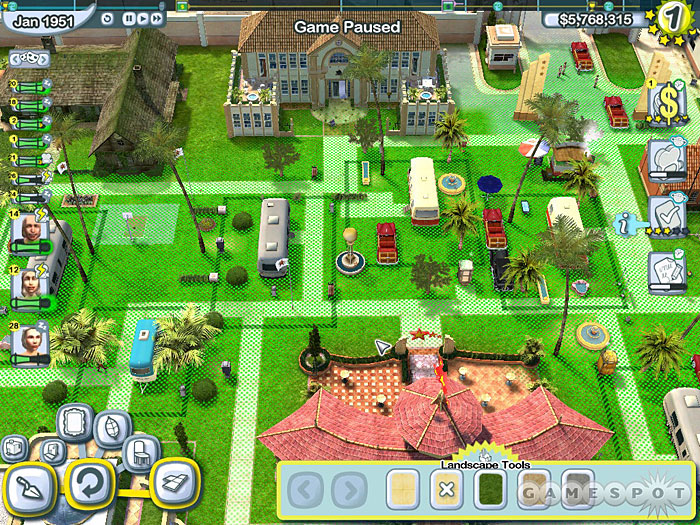
Trailers are what you have to house your stars in to keep them happy; the quality of their trailer affects both their mood, and their star rating. When you lay down a trailer, you'll get both a yellow outline around its footprint, and a green outline around a further border. This border indicates how much space "belongs" to the trailer; any decorations, fauna, or other objects built inside this border will appear with a green footprint, and will increase the prestige of the trailer itself. This is important when it comes to boosting the Trailer ranking of a star's Star Power.
There are a number of trailers that you can unlock throughout the game, including Rickety, Cheap, Comfortable, Plush, and Palatial. (Palatial trailers can only be unlocked through a Certificate, though.) Obviously enough, the more expensive the trailer, the happier it'll make your star, and the higher it'll boost their Trailer ranking.
Dealing With Stars
Most of the employees of your studios are going to be good worker bees. You won't have to worry about the moods or temperaments of janitors or scriptwriters, for instance. You will, however, have to coddle and take care of your stars and directors, or they'll become unhappy and give poor performances in films. Here are a few tips on taking care of your high-maintenance stars and getting the most out of them.
Pre-selection
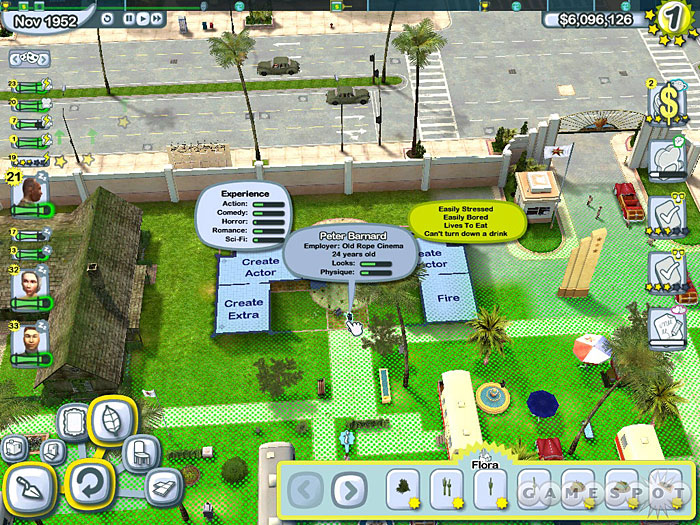
When someone lines up at your Stage School for a job as an actor or director, you'll have the opportunity to check them out (by right-clicking on them) and see some basic personality variables, such as their calmness, resistance to stress and boredom, and tolerance for food and alcohol. You can also check out their looks and physique, which determine their overall ability to attract audiences, but analyzing their personalities is arguably more important, because it will help you know which prospective talent will be easy-going and hardworking, and which will be almost unusable due to their high-strung neediness. Although there are plenty of variables to look at here, most of the time you'll spot rankings in the three or four categories you need to worry about. (If a variable doesn't appear in their little bubble, then you can presumably assume that they're of average tolerance in that category.)
Stress: Bar none, the most important category to look for in a prospective star or director is the capacity for stress. Making movies is a stressful job, after job, especially when you put your stars through the Hollywood ringer. We'll deal with stress-management tips elsewhere in this chapter, but for now, now that stars with attributes like "Doesn't Stress Easily" are going to be easier to live with than those that get stressed out quickly. Stress can be dealt with, but it's difficult to do so.
Boredom: We never found boredom to be much of a game-breaker in itself, but it can be difficult to manage a star that has a problem with both boredom and stress, since those factors often counterbalance each other. Stars with low tolerance for boredom need to be kept busy, either in rehearsals, filming movies, or practicing on a set. If you leave them to their own devices, they'll get bored easily and will thus be unhappy. Again, we'll talk about dealing with boredom elsewhere in this chapter.
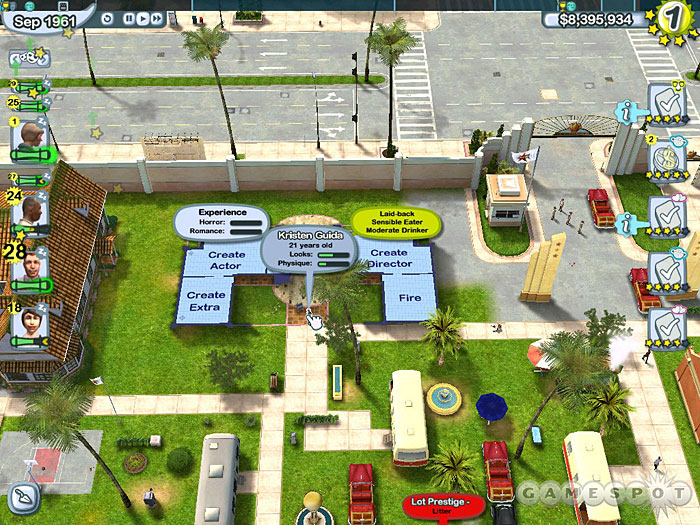
Food Addiction: Food is a good antidote to stress for your stars, so you'll want to try and pick people that "Eat To Live" instead of "Live To Eat." Otherwise, you won't be able to feed them as much to relieve stress. If you overfeed a star that has a low tolerance for food, they're liable to become addicted, which isn't a good thing, since you'll have to cart them off to rehab.
Drink Addiction: If a star loves to drink, then they're likely to become addicted to drinking when you plop them down at a bar for some stress relief. Drinking is one of the most efficient ways to relieve stress, so if at all possible, you'll want to ensure that a star that tends to get stressed out has a good tolerance for alcohol.
If a prospective star is easily stressed, then you can counteract that with drink or food, so that alone isn't worth passing them over. (You will likely have to stop production on longer films in the middle of shooting to de-stress them, though.) If, however, you're forced to hire someone that's easily stressed, easily bored, and has a low tolerance for food and drink, then you'll probably either want to hire them and fire them immediately to attract new talent, or just hire them as an extra. Extras won't need to be mollycoddled like stars are, so you'll be able to get away with paying them less and working them into the ground if you wish.
Dealing With Stress
One of the most limiting factors in dealing with stars is their propensity to become stressed out as they make films. Shooting a film causes stress to build up, as does practicing on a set, to a lesser degree. You'll be able to gauge your stars' tolerance for stress by right-clicking on their icons on the left side of the screen; stars with a low tolerance for stress will require more maintenance than highly tolerant stars.
This is mostly because stress thresholds are one of the prime barriers to getting a good performance from your team. If a star reaches the lower end of their stress threshold, they'll often walk off the set if they're shooting and refuse to return to work until they've cleared their heads a bit. Thus, if possible, it's best to get them as mellow as possible before sending them in for rehearsals. There are a number of ways to do this, obviously.
Environmental Distractions: If you notice that a star's getting stressed, you can attempt to relax them by picking them up and tasking them on a basketball court, a nice fountain, a car, a bath, a park bench, etc. These items can help them relax a bit, but are generally going to be somewhat inefficient in doing so, since your star will often just poke around the item for a bit and then walk away.
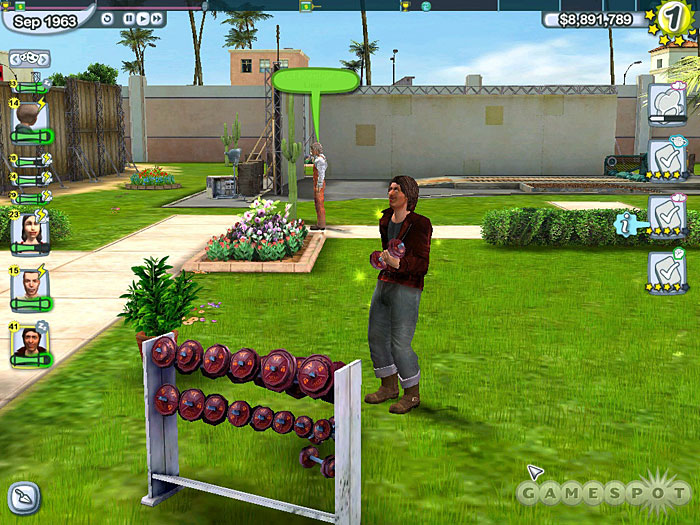
Note that, when you unlock trailers, you'll be able to plop plants and decorations around the trailer (indicated by the small property line around it) to further increase your star's happiness. They might not use the objects autonomously as often as you'd like, but they will help boost the star's prestige meter. When you have trailers for your stars, you'll also be able to drop them directly onto the trailer to cause them to Relax.
Food and Drink: One of the most efficient ways of decreasing stress levels in The Movies is to pick up your star and put them near a bar or restaurant. A little taste of the finer things in life is usually enough to perk your stars right back up, but of course, you'll have to watch their addiction meters to ensure that they don't wind up getting hooked on the good stuff. If your star is more resistant to food than drink, then you'll want to place them at a restaurant, and if they can hold their liquor better than their food, use booze to get them back in the swing of things.
Just be sure to keep an eye on your stars when they conspicuously consume. They seem to "stick" to bars and restaurants for a bit longer than they would other environmental hotspots, so if you just leave them there they might go on something of a binge. Try to remember whom you've placed at a bar or restaurant, and pull them off when their stress meter backs away from the critical line.
As your stars near their addiction meter, they'll start to behave more erratically. Stars that are heavy drinkers, for instance, will sometimes stagger around drunk, making for a perfect photo opportunity for the paparrazi. Unfortunately, they'll also sometimes leave a film set while it's shooting in search of a fix. You should be able to correct this by watching for red exclamation points that pop up when shooting is interrupted. If you notice one of your stars wandering off the set for booze, you can manually drag them back to the set and force them to get back to work; so long as their stress meter doesn't drop below their threshold, they should be able to hold out until the end of filming before they need to get back on the sauce.
Free Time: Sometimes, all your star really needs is some time away from the stress and pains of the jetset life of a movie star. After shooting wraps on your 40-month production, for instance, you might want to just let your stars do their own thing for a while, instead of ramming them back into another production right away. The AI on your stars isn't necessarily as efficient as you would be in attending to their needs - they'll often wind up doing nothing at all - but if you let them wander off and do their own thing for a while, their stress meter should gradually restore itself, just by virtue of being off the set.
Maximizing Prestige and Star Power
Star Power
Each star of yours, whether actor or director, has a star power ranking which scales up from zero stars to five stars, in a fashion similar to that of your studio. Increasing the star power of a star will increase the quality of the movies that they're in, but will also increase the star's salary demands and other desires. You also need to increase star power in order to earn some of the rewards that come along with having a star at a certain star power level; maximizing this rating is quite difficult, but can be done.
If you click on your Studio Rating in the upper right corner of your screen (the large sun icon near your available money), you'll pop open a few different tabs of info relating how your studio compares with the others. If you click on the middle tab here, you'll get a list of your stars. Hover over one of your star names to learn about all the factors involved in star power; there are nine in all. You don't need to worry about all of them at the outset, but as you try to get your talent up above four stars in their star power ranking, you'll eventually need to deal with all nine of them.
Movie Success
In short, the star rating of the last movie that the star was in. (This may also be an average of the last few movies, or it may just take the highest value rating from the last few movies.) Since you'll be unlocking advanced Script Offices, new technology, and things like post production and PR, you shouldn't have a hard time releasing five-star movies pretty consistently after you're a few decades into the game. Just keep your stars practicing in one or two core genres, and keep their moods up, and they'll contribute greatly to the success of a film.
Salary
At zero salary, you'll have no stars in this factor; it maxes out at around $100,000. Of course, you might have to wind up paying your stars more than that to keep them happy, but as long as you're paying them at least 100k, you should maximize the effect that their salary has on their star power.
Performances
This factor depends on the kind of performance that your actors have been giving in recent films, which mostly depends on their mood and genre experience. Attempting to keep your stars in the glowing green mood stage will help maximize this meter, but you should also keep in mind that they'll have a hard time giving appealing performances in most genres as they get older.
Image
Image primarily revolves around looks and fashion. Looks are mostly dependent on youth; the younger a star is, the better they'll look. However, if you're looking for a five-star performer, you'll need to build them up over decades, meaning that you'll probably have to indulge in some plastic surgery to increase their looks when they start to get too old to be hip with the kids. Physique rating can also help here, so be sure to have your stars work out whenever their physique stars to slip into uncomfortably low ratings. You can also use the Implants or Liposuction options in your Cosmetic Surgery building to increase Physique.
Fashion is somewhat easier to deal with; just plop your star in the Makeover Department every few years and select the most fashionable clothing that's available. Your stars get quite upset when they have to wear outdated clothing, so check back for new clothes around the end of every decade, or when your researchers unlock new clothing options.

Entourage
Like Salary, this is a linear factor. Your star has no influence here without any entourage members, but will maximize this factor when they have six assistants. Entourage members can be taken out of employment lines, or can be retasked from other jobs, but won't be able to do anything other than fawn over your star, and also seem to lose all the experience they've gained in their other jobs when they become assistants.
For most of the game, you'll probably want to give your biggest stars just enough entourage members to keep them from throwing a fit; when you try to increase their star power to five, though, you'll have to give them six assistants to put them over the top. If you're just doing this for the sake of earning a certificate, then you can immediately retask all of the assistants back to other jobs when you earn the reward.
Also, keep in mind that when a star retires or is fired, his entourage members disappear. If someone's creeping up on their 70th birthday, be sure to grab all of his or her assistants and plop them into another job before they go away.
Trailer
This indicates how fashionable the star's trailer is. As you proceed through the game, you'll unlock more trailer options, with new trailers becoming progressively more expensive, but progressively nicer as well. Maximizing this rank will require the most expensive trailer, most likely.
You can also increase the trailer factor by building numerous decorations and plants into the area around the trailer. When you're in the zone of influence, your item placements will turn green around their bottoms, with a small nub pointing towards the trailer; this indicates that planting your object in the spot indicated will add to the prestige of the trailer. Obviously enough, a variety of highly expensive items, such as cars and fountains, or the $8,000 entrance stones, will have the biggest impact here. You can even build other small structures, such as VIP Restrooms, on the trailer's lot.
Note also that trailers do have maintenance values as well, and that these can affect the prestige of the trailer. If you're having trouble getting your Palatial Trailer up to the full three stars, try dropping a Builder onto one of the maintenance spots to have them get it back in tip-top shape.
Press
One of the more annoying factors to fulfill, your star's press relationship can be boosted by dragging the photographers from the main gates over near your stars when they're doing something newsworthy, such as having dinner with another star, getting drunk, or having plastic surgery. Although your star's mood might be affected by being the constant target of the papparazzi, being photographed is always beneficial to your star's press rating.
Unfortunately, you'll only have a limited number of photographers to use at any given time, and after you drag a photographer over to your star to take a photograph, he'll disappear for a good amount of time. If you want to get one of your stars up to a full five-star rating, then you'll probably want to use almost all of your photographers on him or her, even if it means neglecting the rest of your stars.
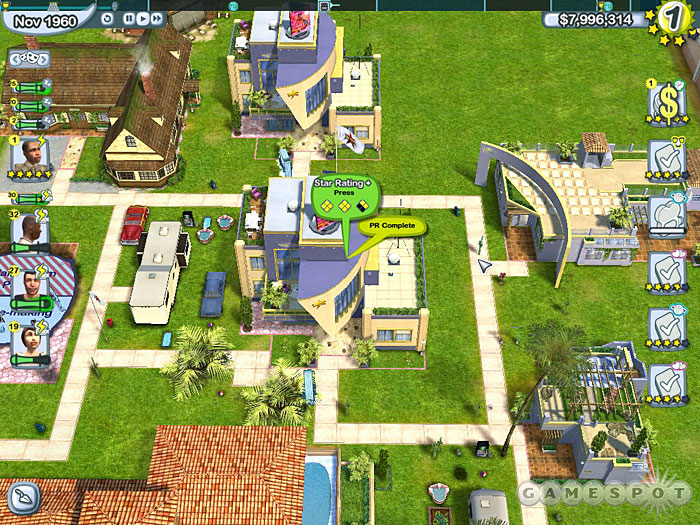
You can also increase your press rating by having your star give press conferences in the PR Office just before you release a film, or even while it's still being shot, if you don't need that star on the set for the entire time.
Relationships
Again, Relationships is a fairly tough factor to increase, or at least to maximize. Obviously enough, this is determined by your star's relationships with other stars, which can only be improved through some time-intensive interactions.
Stars don't normally choose to talk to one another, so you'll usually have to force them to do so by picking one of them up and dropping them down near someone else. If you do so, they'll stop and chat for a while, and this will almost always increase their relationship ranking; there aren't any Sims-esque blowups when you try to force incompatible stars to talk to each other, in other words, at least as far as we can tell. Unfortunately, the relationship increase you get for mere talking is relatively minor, so if you want stars to increase from Acquaintances to Friends, you'll have to get them talking quite a bit.
When your stars are talking to one another, you'll be able to read their thoughts by looking at them on your screen. Usually you'll hear something like "Well, this person is pleasant enough to be with here!" or something similar. When you start hearing things like "I wouldn't mind being someplace a bit more intimate with this person," though, you'll have to take things up a notch by placing your characters side by side in a restaurant or bar. This helps them increase their relationship further, while also helping them relieve stress. Just be sure that you don't move your stars into intimacy too quickly, or the situation will be awkward and potentially damaging to the relationship. Again, watch the thought bubbles to see if your stars are comfortable; if they're not, drag one of them away from the restaurant or bar and try to get them talking out in the open again. (The order you want to follow here, in order from least to most intimate, is Bar, VIP Bar, Restaurant, VIP Restaurant.)
Working with another star on a movie or practicing a genre with them will also increase the relationship between the two stars, albeit at a somewhat slower pace than more focused socializing.
Maximizing your relationship meter will require your star to have at least one close friend, ideally at the Soul Mate level, and a few other high-level acquaintances or friends. Unfortunately this is quite time-consuming, but there's no real shortcut here; you just have to keep a close eye on the star that you want to make into your superstar, and continually force him or her to socialize with other stars. Luckily, this also increases the star's mood and seems to relieve stress, especially when you're socializing at a bar or restaurant.
Awards
Awards come as a result of attending the awards ceremony that pops up every five years. If you've been focusing on increasing your star's star power, and have enabled them to give good performances by practicing genres and ensuring that their moods are high, then they should consistently be getting awards, and you won't have to worry overmuch about this category by the time you get around to worrying about getting them up to star power five.
Reaching Five Stars
By the time you reach the eighth certificate, you should hopefully have one of your actors or directors up to four stars, but getting them up to the fifth star rating will be quite difficult. In order to properly do this, you'll pretty much have to stop making movies, at least movies involving your star and his or her highest-rated relationship friend, and just concentrate on maxing out all of the factors above.
Movie Success, Performance, Salary, and Entourage are all somewhat easy to take care of; just have your star take part in a film or two from your First Class Script Office when they're in a good mood to max out the former two, and pay them a bunch of money and give them a large entourage to max out the latter two. Awards are likewise something that should take care of themselves, especially if you're working with a star that's been at #1 on the charts for the bulk of their career. (If you have a low Awards ranking, then you're going to have a hard time making that up quickly.)
So far as Trailer goes, be sure to build a Palatial Trailer and stock it with a bunch of expensive items. If you can't get this all the way up to maximum, no matter how much stuff you place around the trailer, check its maintenance level and drop a Builder near it to fix it up. So far as Image goes, Nip & Tuck works well for Looks, while Implants or Liposuction will help bulk up Physique. Fashion is obviously taken care of by a Makeover.
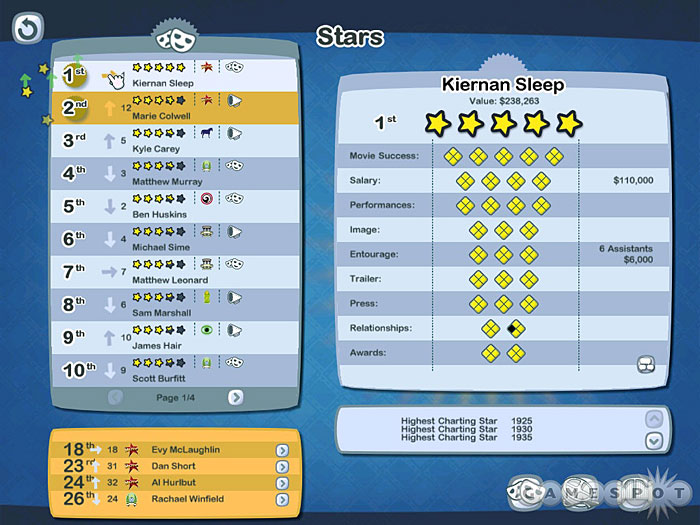
Press and Relationships are probably going to be the most frustrating factors to maximize, since they decay so quickly, especially in the case of Press. So far as Relationships go, hopefully you've been working on having your first-rank star socialize with at least one of their working partners throughout the game. If not, you'll have to start taking part in a wearying amount of dropping stars to talk to one another. Your stars will have marginally better relationships if they've been working together, so drop the star you're trying to boost next to his or her previous co-stars or directors to get a bit of a head start. There aren't a lot of ways to quickly boost Relationships, so this'll be a bit of a drag if you haven't already been focusing on this stuff.
Press can be taken care of either with press conferences at the Publicity Office (each press conference will fill one-third of the total Press ranking), or by dropping photographers near your star while he's socializing or in surgery or in rehab or something like that. (You don't have to worry about your star's mood while getting to five stars, since none of the factors here rely on it.) Photographers take forever to come back to your lot when they run off with their pictures, though, so press conferences are probably the way to go here. Press decays incredibly quickly, though, so you'll probably want to save this factor as the very last factor you're going to try and maximize. If you find that you still need a bit of Relationship when you're done with your press conferences, drag your actor over to another star, and drop photographers near them as they talk when Press decays. Hopefully you'll be put over the top and get your fifth star power ranking fairly soon.
Once you actually do get a five-star-power star, you'll be able to immediately fire them, if you wish; they'll probably be pretty close to retirement age anyway. All the eighth certificate requires is for you to have reached five stars at some point; it doesn't care whether or not you still have the star on your payroll or not. Just note that if you fire or sell a star, or if he or she retires, the entourage you've built up will disappear and won't come back to your employment lines. That's not a good thing, so be sure to pick up the entourage and retask them to other menial tasks before getting rid of your star.
Studio Rankings
If you click on the studio ranking indicator in the upper right corner of the screen (near your available cash), you'll bring up the Studio Charts, indicating how powerful and prestigious your studio is when compared to the other studios that are currently making films. In order to increase your ranking here, you'll need to take into consideration five different factors, which you can check out by mousing over your studio's name.
Capital
Capital is pretty simple to comprehend: it takes into account how much cash you have in your bank account at any given time. So long as you release quality movies that make good amounts of money, you should be able to keep this maximized almost all the time after you get through the 1920's. The amount of money you need in your account to max out this factor may increase as time goes on, though, so if you notice this factor decreasing, you may just have to stop spending money for a while, or produce some lower-quality films that are expressly intended to get your cash flow back into a positive state.
Movies
The Movies ranking increases in proportion to the quality of the films that you create. The better the movies that you make, the higher this factor will be. We'll discuss what goes into a quality film production elsewhere in this guide. Maxing out this meter will be quite difficult when you're attempting to get a five-star Studio ranking, though; you might want to try stockpiling three or four five-star productions and then release them all at once.
Stars
The Stars ranking takes into account the aggregate star power of all of your stars. You don't need to have any superstars in your ranks to max this out; just try to get one or two stars high up on the star rankings, and the rest of your stars should progress naturally enough to get you towards the upper end of this factor. This area can take a hit when your bigger stars start to retire, though, so be sure to stagger the ages of your stars as best you can by occasionally firing poorly-performing stars as they hit middle age and hiring new ones to replace them.
Lot Prestige
Lot prestige depends on a number of different factors around your lot. To get a list of all of these factors, go to your Production Office and right-click on the "i" symbol in the middle of the building; you'll get a readout on what different aspects of your lot are being taken care of, as well as which ones need to be looked into. There are seven factors in all:
- Attractiveness
- Connectedness Rating
- Maintenance
- Catering Rating
- Sanitation Rating
- Ornament Rating
- Cleanliness
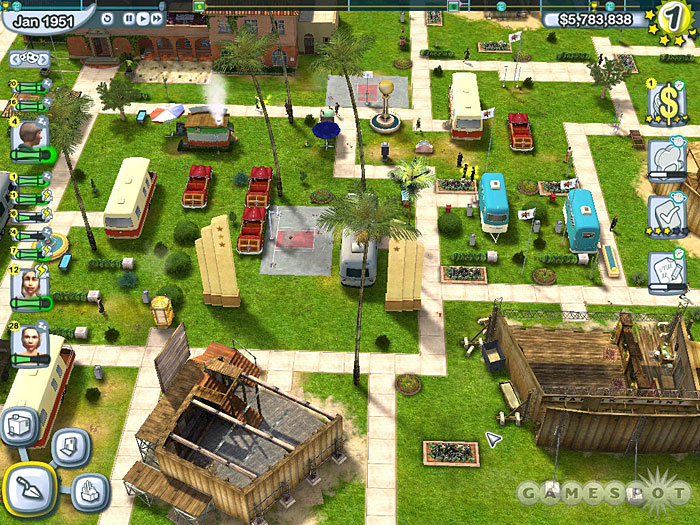
Attractiveness requires you to place lots and lots of decorations, plants, and ornamentation around your lot. The more, the merrier. Be especially sure to lay down plants and decorations around your paths as you build onto empty parts of your lot, and be sure to lay down grass all over the place, and replace it when it wears out due to people walking around.
You can spot-check the attractiveness of an area by hitting the L button; dense green dots indicate that an area is very attractive, while dense red dots indicate that an area's unattractive. In general, if you just lay down grass on an area, it'll be of neutral attractiveness; building ornamentation in an area will raise its attractiveness, while building bathrooms or other unattractive buildings will lower it.
Connectedness depends on how many of your buildings have their front doors connected to paths. Ideally you'll want to have one solid set of paths leading to each building on your lot, with no gaps.
Maintenance requires plenty of Builders on your lot, as they're the ones that'll consistently be repairing buildings in their free time, without input for you. As buildings get used, they'll constantly fall into a state of disrepair, forcing you to repair them to prevent your maintenance level from dropping too low. You can right click on any building to see its maintenance level; if it's too low, you can select the builder tab from your personnel menu and drag a builder over to take care of it.
Catering is a measure of your available food services. So long as you have one of the nicest restaurants available to you up and running, it shouldn't be difficult to max this out.
Sanitation measures how many bathrooms you have. You should find that you don't need an absurd number of bathrooms to keep this ranking up, so build newer bathrooms as you unlock them and destroy the older bathrooms to raise your attractiveness level.
Ornamentation relies on the variety and contemporary style of the ornamentation that you lay down. Obviously enough, buying a lot of ornamentation and laying it down all over your lot will help you raise your score here, but you may also have to periodically check your lot for old-style decorations and delete them as new ornamentation becomes available.
Cleanliness is a measure of how much litter is scattered around your lot. To curtail the litter problem, place plenty of trashbins around the densely populated areas, and hire a few janitors to pick up any litter that your other workers drop. Note that demolishing a building will cause a large amount of litter to be generated, so be sure to drop janitors in the area near a destroyed building to start cleaning it up.
In the end, so long as you spend the cash to get the best accoutrements for your lot, you shouldn't have too many problems topping off your Lot Prestige ranking.
Awards
Awards is kind of a "win more" rating; if you're consistently winning awards, then your studio will probably be in first place no matter what else you're doing, but if you're having a hard time winning awards, then the lack of rating here will make it harder to advance up the studio charts. At any rate, in order to win awards you have to meet the criteria set for you at the awards shows that pop up every five years. Generally these are things like having the highest-rated actor or director, having the highest-rated movie, being atop the studio charts, etc. This only seems to take into account the latest awards show, so you'll have to consistently win awards in order to keep this factor up high. You can always check the awards criteria by clicking on the golden cup that appears in your timeline every so often.
Reaching Five Stars
For the eighth Certificate, you're going to need to reach a five-star studio ranking. This is going to be rather tough to accomplish, and certainly seems harder to do than reaching five stars with one of your stars. The Capital, Stars, and Lot Prestige factors will all more or less take care of themselves as you work your way through the game, so long as you're competent at the core business of running your offices.
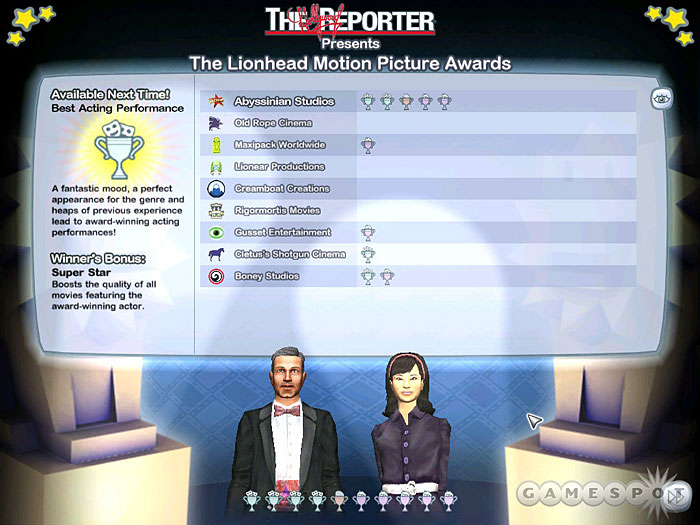
It's the Awards and Movies factors that will be more difficult to fulfill, or at least maximize. The Awards factor here is harder to max for your studio than it is for a star, since it seems to only factor in the latest awards show; you'll probably need to win at least five or six awards every show in order to maximize this out. To discover the criteria for this, click on the yellow trophy that appears on your timeline and mouse over the differently-colored trophies on the bottom of the screen. Some of these are going to easier to get than others, such as highest-ranking star, highest-ranking studio, highest-ranking film, best direction, most prestigious lot, etc.
Some of them, however, are going to be more difficult to fulfill, such as the one that requires you to have a star that climbs the chart quickly. You'll have to plan ahead for some of these, such as by having a star with a lot of practice in a genre, but few starring roles, then quickly start working on building him a trailer, paying him more, getting him into the Publicity Office, and so on, so that you can hopefully take him from the bottom of the charts to near the top within the five years between awards ceremonies. Doing this every five years is tough (since the award starts fresh after every ceremony), so you might want to wait until you're ready to push for the five-star Studio ranking before you concentrate on these.
The Movies factor will be a bit more difficult, really. It apparently takes into account the average star rating of the past few films that you've released. You'll have to consistently release films at or near the five-star mark to get this one over the top. You may want to hold onto your scripts after they're filmed, stockpile them, maximize their public awareness at your PR facilities, then release a bunch of them at the same time if you think they'll all come out as five-star productions. This will essentially require you to stop making money for a few years, though, so be sure you have enough cash in your account to keep your Capital ranking maxed out during that time.
Making High-Quality Movies
As you proceed through The Movies' tycoon mode, you'll find yourself making better and better movies just as a result of star experience, better technology, and better scripts. Still, if you want to maximize the star rankings of your films, then it helps to know exactly what factors go into determining these rankings. Note that you don't need to necessarily emphasize all of these factors to reach a five-star film, but you'll certainly want to try and emphasize as many of them as possible if you want your stars to be of consistent quality.
This list goes from biggest factors to smallest ones, but is in a very, very rough order, so feel free to play to your strengths. All of the factors have an effect on your film.
Script Quality: The better your Script Office, the better the scripts that your writers will produce. This isn't set in stone; a First Class Script office will produce scripts worth between 3.75 and 4.25 stars, on average. This variance seems to be impacted a bit by the relative interest in the genre of the script itself.
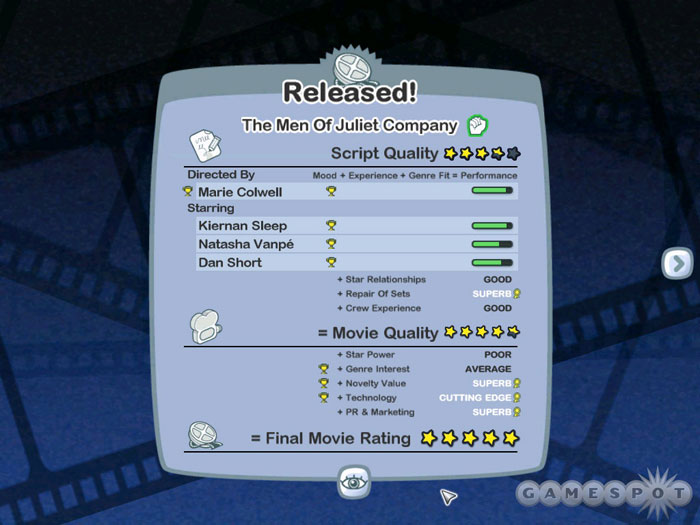
Film Length: This seems to be tied into the quality of the script; scrips with a higher star rating will automatically have longer lengths. Anyway, longer films will rank more highly than shorter ones will.
Star Mood: The happier your star is, the better their performance or directing will be. It does seem to get easier to fulfill these moods as time goes on, as you'll have better trailers, Cosmetic Surgery, Publicity Offices, and a few other buildings that'll let you greatly increase their satisfaction with themselves.
Star Experience: The more experienced your stars are in the genre you're filming, the better they'll be.
Star Rankings: The higher your star power, the more likely it is that people will want to see your film.
Genre Popularity: You can right-click on your scriptwriting office to learn about which genres are popular when you start to write a new script. This is actually calculated when you release your film, though. Unfortunately, the process of making a film eventually becomes so long that it's difficult to anticipate what will be popular when the movie's done; it's best to just focus on one or two genres and get your stars well-versed in that genre. You should be able to counteract a low-popularity genre in this way.
Star Relationships: If the big stars of your film are Friends or better, then they'll deliver better performances and the entire film will be better off for it.
Genre Fit: Each of your stars is ranked according to their fitness towards the genre that they're working in. Finding specific information for each genre is difficult, but in general, most of the genres are better off if your characters are young, good-looking, and physically fit. Comedy seems to be the exception to this; for that genre, you can use older actors. Overall, though, genre experience will usually counteract a poor genre fit. Don't forget that you can send your stars off to cosmetic surgery if you want them to look younger or more physically fit.
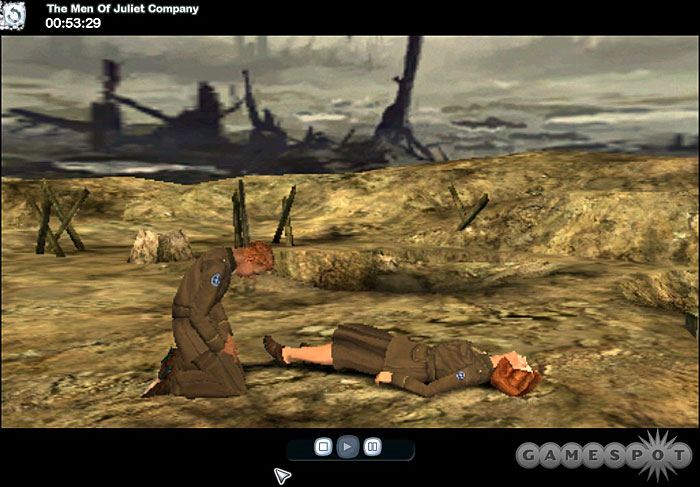
Technology: If you get your researchers to unlock new technology in the Laboratory, you'll be able to get stuff like CGI effects, pyrotechnics, and better film stock well before they'd normally be available to you. Getting this ahead of time can increase the wow factor of your films.
Crew Experience: Your movie crews will gain experience over time, but very, very slowly. The only way to increase experience is to have them make more movies.
Novelty: As you use sets in multiple films, their novelty value will fade away. Using fresh sets that have just been unlocked and built will increase this factor.
Public Awareness: The more PR you have for a film, the better the rating will eventually be. Be sure to match its PR with an appropriate budget, or your critics will accuse you of advertising it too heavily.
Set Repair: The maintenance quality of the sets that you're working on also affects the quality of a film. If you notice that a film is going to be shooting on a specific set for a while, drag a builder over to it and repair it so that it appears in good repair for the rest of the shoot.
Number of Leads: The more lead actors you have in a film, the better it'll wind up being. Higher-level scripts automatically have more actor slots.
Number of Extras: Again, higher-level films will usually automatically have a larger number of extras.
Costume Changes: The more costume changes a film has, the more highly-ranked it'll be. Keep this in mind when writing custom scripts. Computer-generated scripts will have a few costume changes inserted automatically.
Certificates
You can earn Certificates of achievement throughout the game by achieving certain requirements. You should try to hit these certificate achievements as soon as it's possible, as the rewards for doing so are sometimes substantial, especially in the case of the Script Offices that you can unlock later on. There aren't any time limits on these, however, so if you need to take your time, feel free to do so.
If you're ever curious to know where you stand with these certificates, click on the golden trophy on your timeline that indicates that another awards show is upcoming. The first screen here indicates the awards that you can win, but to check out the certificates, click on the arrow on the right side of the screen to see the requirements for the next reward. You can mouse over any of the requirements to see where you stand in relation to them, which is especially helpful for the requirements that involve career earnings.
Certificate One: Wannabe Big Cheese
Requirements
- Release five movies.
- Earn a total of $500,000.
- Release movies with a total star rating of 5.
Rewards
- Custom Script Office
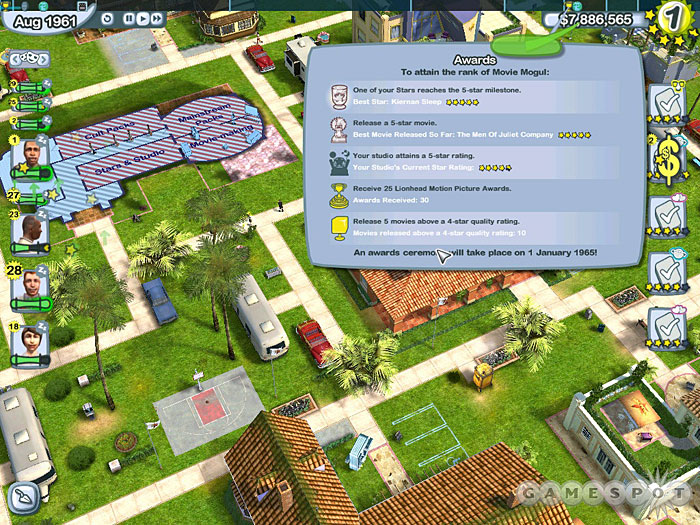
Certificate Two: Junior Studio Manager
Requirements
- One of your Stars reaches the 2-star milestone.
- Release a 2-star movie.
- Your Studio reaches the 2-star milestone.
Rewards
- Rural: Forest Set. (Oriented towards Horror.)
Certificate Three: Promising Studio Manager
Requirements
- Have at least $1,000,000 sitting in your bank account.
- Receive two Lionhead Motion Picture Awards.
- Release five movies above a 2-star quality rating.
Rewards
- Proficient Script Office
You definitely want to try and race towards this milestone as quickly as possible, as the Proficient Script Office will be your script factory for a good length of time. If you're producing quality films, it shouldn't be difficult to reach this milestone.
Certificate Four: Respected Studio Head
Requirements
- One of your stars reaches the 3-star milestone.
- Release a 3-star movie.
- Your Studio reaches the 3-star milestone.
- Release 15 movies.
Rewards
- Publicity Office
Certificate Five: Celebrated Studio Head
Requirements
- Earn a total of $7,000,000.
- Release Movies with a total star rating of 35 or more.
- Have at least $4,000,000 sitting in your bank account.
- Receive 8 Lionhead Movie Studio Awards.
Rewards
- Urban: Wall Section. (Oriented towards comedies.)
Earning a total of $7,000,000 means that that's the total amount of money you've made throughout your career. Essentially it adds the amount of money you have in the bank to the amount you've spent on salaries and sets.
Certificate Six: Highflying Moviemaker
Requirements
- Release five movies above a 3-star quality rating.
- One of your stars reaches the 4-star milestone.
- Release a 4-star movie.
- Your Studio reaches the 4-star milestone.
Rewards
- First Class Script Office.
The first really difficult certificate to receive. The studio and movie milestones shouldn't be too hugely difficult to reach, so long as you keep an eye on your studio's prestige level and release films that you know you're good at. It's usually the Star (i.e. actor or director) milestone that you'll have trouble with. We have a whole section of this guide dedicated to letting you know how to increase your star power, so feel free to check it out for tips.
Certificate Seven: Big Fish
Requirements
- Release 25 Movies.
- Earn a total of $15,000,000.
- Release movies with a total star rating of 60.
- Have at least $6,000,000 sitting in your bank account.
Rewards
- Palatial Trailer.
Certificate Eight: Movie Mogul
Requirements
- One of your stars reaches the 5-star milestone.
- Release a five-star movie.
- Your studio attains a 5-star rating.
- Receive 25 Lionhead Motion Picture Awards.
- Release 5 movies above a 4-star quality rating.
Rewards
- Urban: Municipal Building Set.
The hardest tasks here are to acquire a five-star Star and a five-star Studio. See our "Maximizing Prestige and Star Power" for tips on both of these tasks.
Certificate Nine: Movie-Making Legend
Requirements
- Release 50 Movies.
- Earn a total of $35,000,000.
- Release movies with a total star rating of 150.
- Have at least $20,000,000 sitting in your bank account.
- Receive 50 Lionhead Motion Picture Awards.
Rewards
- Suburban: School Library Set
Got a news tip or want to contact us directly? Email news@gamespot.com
Join the conversation